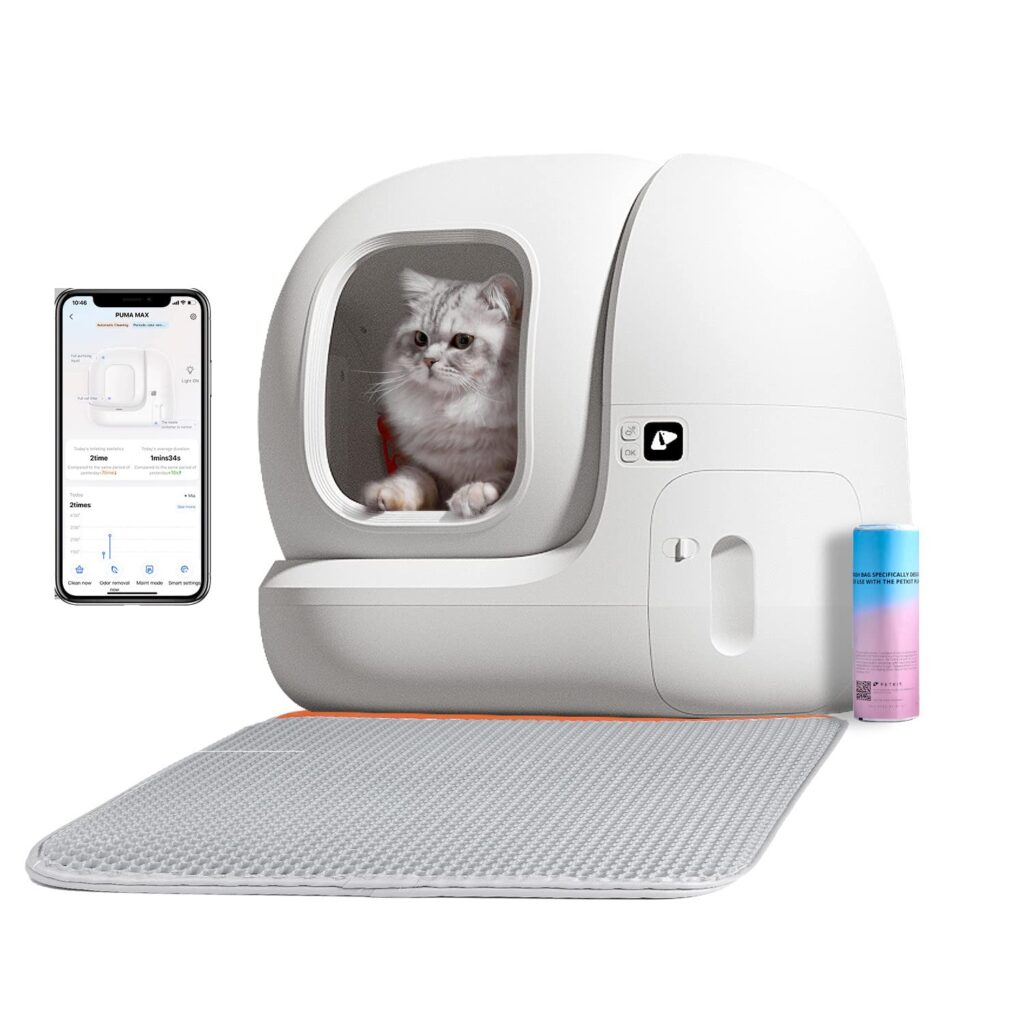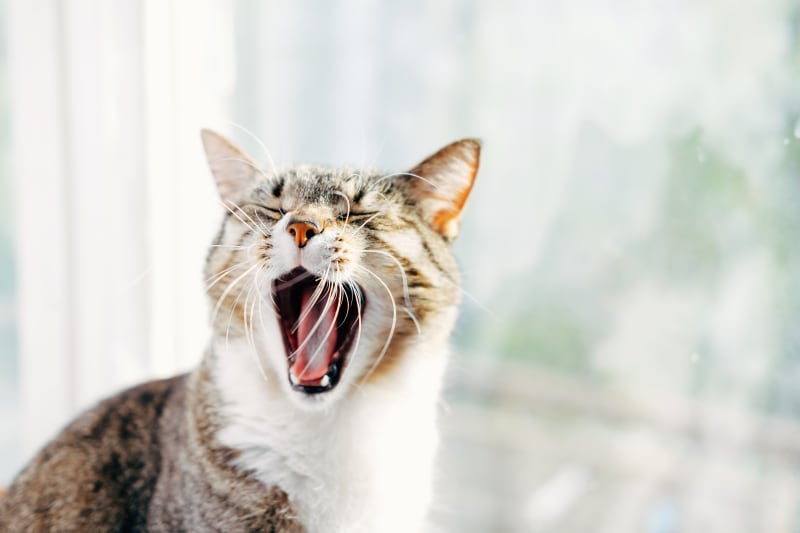Kitten breathing fast while sleeping could indicate a potential health issue. We will explore the possible causes of rapid breathing in kittens during sleep and provide guidance on when to seek veterinary assistance.
Understanding your furbaby’s respiratory patterns is crucial to ensure their overall well-being and address any underlying concerns. While occasional fast breathing may be normal, persistent or irregular patterns should be monitored closely. By observing other symptoms and considering potential triggers, you can determine if your kitten requires medical attention.
Remember, the health and happiness of your feline companion should always be a top priority, and seeking professional guidance is essential when in doubt.
Contents
- 1 Signs Of A Fast Breathing Kitten
- 2 Common Causes Of Fast Breathing In Kittens During Sleep
- 3 When To Be Concerned About Your Kitten’s Fast Breathing
- 4 Tips To Help Your Kitten With Fast Breathing While Sleeping
- 5 How To Prevent Fast Breathing In Kittens
- 6 Treating Fast Breathing In Kittens: Veterinary Intervention
- 7 Providing Comfort And Support For Your Fast Breathing Kitten
- 8 Frequently Asked Questions On Kitten Breathing Fast While Sleeping: Is Your Furbaby Okay?
- 9 Conclusion
Signs Of A Fast Breathing Kitten
Seeing your kitten breathe rapidly while sleeping can be concerning, but it doesn’t always indicate a problem. However, it’s essential to be aware of other signs that may accompany this behavior.
One of the signs to watch out for is an increased breathing rate while sleeping. If your furbaby’s breaths are noticeably quicker than usual, it could be a cause for concern. Another red flag is restlessness during sleep. If your kitten seems agitated or uncomfortable, it’s best to consult a veterinarian for a proper evaluation. Additionally, panting or open-mouthed breathing is not typical for a sleeping kitten and may indicate an underlying issue.
Remember, our cute little furry friends may have different breathing patterns when they sleep. However, if you notice any additional symptoms or have concerns about your kitten’s well-being, it’s always best to seek professional advice.
Common Causes Of Fast Breathing In Kittens During Sleep
Fast breathing in kittens during sleep can be concerning for pet owners, but in many cases, it is perfectly normal. However, it is essential to be aware of the common causes that could signal a potential issue with your furbaby’s health.
Anxiety or stress: Just like humans, kittens can experience anxiety or stress which can lead to elevated breathing rates during sleep. Providing a calm and safe environment for your kitten can help minimize this.
Overexertion or physical activity: Kittens are full of energy and love to play. After an intense play session or exercise, their breathing can be fast as they recover and rest.
Respiratory infections or allergies: Kittens can be prone to respiratory infections or allergies. If your kitten’s fast breathing is accompanied by other symptoms like sneezing, coughing, or discharge from the nose or eyes, it is advisable to consult a veterinarian for further evaluation and treatment.
When To Be Concerned About Your Kitten’s Fast Breathing
Kitten Breathing Fast While Sleeping: Is Your Furbaby Okay?
When to Be Concerned About your Kitten’s Fast Breathing
If you notice that your kitten is breathing fast while sleeping, it is essential to pay attention to other signs or symptoms that may accompany this behavior. Rapid breathing alone may not always indicate a problem, as kittens tend to have higher respiratory rates compared to adult cats. However, if the rapid breathing persists for an extended period or is accompanied by other concerning symptoms, it is crucial to consult a veterinarian.
Another sign to watch out for is a lack of appetite or increased lethargy. If your kitten is not eating well or seems unusually sleepy, it could be an indication of an underlying health issue. Changes in behavior and energy levels should not be ignored and should be discussed with your vet.
Lastly, if your kitten is exhibiting coughing or wheezing sounds during sleep, it could be a sign of a respiratory problem such as an upper respiratory infection or asthma. These conditions should be evaluated by a veterinarian to ensure appropriate treatment.

Credit: www.amazon.com
Tips To Help Your Kitten With Fast Breathing While Sleeping
Having a kitten who is breathing fast while sleeping can be concerning for any pet owner. However, there are steps you can take to help your furbaby and create a calm and stress-free sleeping environment for them.
Firstly, ensuring proper ventilation and airflow in their sleeping area is crucial. Make sure their sleeping space is well-ventilated, especially during warmer months, to keep them cool and comfortable.
Additionally, it is important to monitor your kitten’s sleeping patterns. Keep an eye on how often and how fast they are breathing while sleeping. If you notice any significant changes or if their breathing seems labored, it is essential to seek veterinary advice as soon as possible.
Remember, being proactive about your kitten’s health is key. By creating a calm environment, ensuring ventilation, and monitoring their sleeping patterns, you can help your furbaby sleep peacefully and address any potential health concerns promptly.
How To Prevent Fast Breathing In Kittens
Kitten Breathing Fast While Sleeping: Is Your Furbaby Okay?
Providing A Balanced And Nutritious Diet
A balanced and nutritious diet is crucial in preventing fast breathing in kittens. Make sure to feed your furbaby high-quality kitten food that is appropriate for their age and development. The food should contain the necessary nutrients and vitamins required for their overall health. Avoid feeding them human food or foods that are not suitable for kittens, as this can lead to digestive issues and respiratory problems.
Regular Exercise And Playtime To Release Excess Energy
Regular exercise and playtime are essential for keeping your kitten physically active and mentally stimulated. This helps them release excess energy, which can contribute to fast breathing while sleeping. Engage your kitten in interactive play sessions using toys and encourage them to run and jump. This not only provides them with the necessary exercise but also promotes a healthy respiratory system.
Keeping The Sleeping Area Clean And Free From Allergens
Ensure your kitten’s sleeping area is clean and free from allergens that may cause respiratory issues. Regularly clean their bedding, blankets, and sleeping area to reduce the buildup of dust, mold, and allergens. This helps maintain good air quality, minimizing the risk of breathing difficulties while your kitten is sleeping. Additionally, consider using hypoallergenic bedding if your kitten is prone to allergies.
By following these steps, you can ensure your kitten maintains healthy breathing patterns even while sleeping.
Treating Fast Breathing In Kittens: Veterinary Intervention
When your kitten is breathing fast while sleeping, it can be concerning. Fast breathing in kittens can be a sign of an underlying respiratory issue that requires veterinary intervention.
Treating fast breathing in kittens starts with a diagnosis through a physical examination and possible tests. The veterinarian will examine your furbaby to identify any abnormal lung sounds, nasal discharge, or other symptoms. They may also recommend tests such as bloodwork or x-rays to further investigate the cause.
Once the underlying cause is determined, medications or treatments may be prescribed to address the respiratory issue. This can include antibiotics for infections, bronchodilators to open up the airways, or other appropriate therapies.
Follow-up visits and ongoing monitoring are crucial to ensure the kitten’s condition improves and to adjust the treatment plan if necessary. Regular check-ups will help the veterinarian track the progress and make any necessary adjustments to provide the best care for your furbaby.
Providing Comfort And Support For Your Fast Breathing Kitten
When your kitten is breathing fast while sleeping, it can be concerning, but it’s important to understand that this can be normal for young cats. During sleep, kittens may engage in gentle and soothing interactions, such as purring, twitching, or even snoring. These behaviors are a sign that your furbaby is relaxed and comfortable. To provide the best support for your kitten during sleep, ensure they have a warm and safe sleeping spot, such as a soft bed or blanket. Creating a regular sleep routine can also help your kitten relax and get the rest they need. By providing comfort and support, you can ensure your fast breathing kitten is okay and enjoying a peaceful sleep.
Frequently Asked Questions On Kitten Breathing Fast While Sleeping: Is Your Furbaby Okay?
Is It Normal For Kittens To Breathe Really Fast While Sleeping?
Yes, it is normal for kittens to breathe rapidly while sleeping. Their breathing rate can vary, and it tends to be faster when they are in a deep sleep or dreaming. This is because their respiratory system is still developing, and their bodies are growing rapidly.
Do Kittens Breathe Faster Than Cats When Sleeping?
Kittens breathe faster than cats while sleeping due to their smaller size and higher metabolic rate.
Why Is My Kitten Breathing Fast While Sleeping?
Kittens may breathe fast while sleeping due to their high metabolism, dreams, or mild anxiety. It’s usually normal, but if you notice other concerning symptoms, contact a veterinarian.
What Are The Potential Causes Of Fast Breathing In Kittens?
Fast breathing in kittens can be caused by stress, heat, excitement, or respiratory infections. It can also be a sign of an underlying health issue, such as asthma or heart problems.
Conclusion
It is important to keep an eye on your kitten if you notice them breathing fast while sleeping. While it can be normal in some cases, it can also indicate an underlying health issue. By observing their behavior, consulting with a veterinarian, and providing a peaceful environment, you can ensure the well-being of your furbaby.
Remember to prioritize their health and seek professional advice if you have any concerns.

Katie Lindsey is a passionate cat lover and founder of Cats Solution, a comprehensive resource for all things feline. With a lifelong love for cats and extensive knowledge in their care and behavior, she provides expert advice and solutions to cat owners. Through her website, Katie fosters a supportive community where cat enthusiasts can find guidance and heartwarming stories. A dedicated advocate for animal welfare, Katie also promotes responsible pet ownership and adoption. Join her on this purr-fect journey celebrating the joy of feline companionship.



